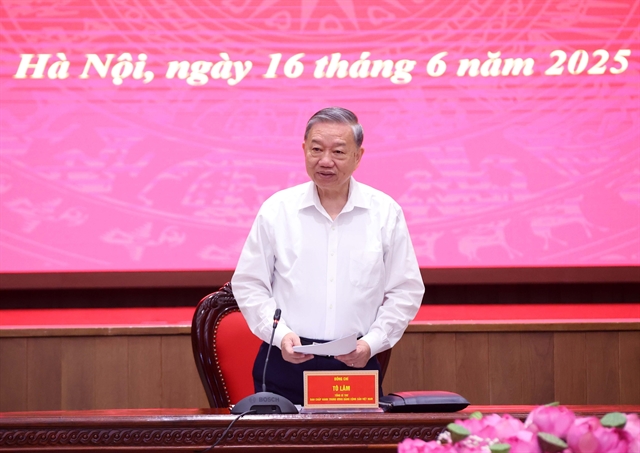 Politics & Law
Politics & Law

 |
| Party General Secretary Tô Lâm chairs a working session with Hà Nội’s Party Standing Committee on Monday morning in Hà Nội.—VNA/VNS Photo Văn Điệp |
HÀ NỘI — Hà Nội must shape a new economic identity based on knowledge, technology and innovation, with creative industries, fintech, smart logistics, high-quality healthcare and education and experiential tourism set to become key drivers of growth.
The capital is also encouraged to boldly experiment with new development models, viewing the nighttime economy as a multifaceted blend of culture and consumption. Circular and green economic models must be regarded as commitments to a sustainable future.
The concept of a creative urban model should serve as a platform for broader social innovation.
Strategic areas across the city should be restructured, not only to accelerate growth but also to attract talent and become hubs where researchers, entrepreneurs, artists and designers find both a high quality of life and opportunities for professional development.
Party General Secretary Tô Lâm made these statements when he held a working session with Hà Nội’s Party Standing Committee to review the city's implementation of recent central resolutions and conclusions on Monday morning in Hà Nội.
The working session also covered administrative reform, citywide stability, defence and security, economic growth and social welfare.
He said Hà Nội has been told to transform into a creative city that prioritises innovative human capital, new ideas and emerging technologies.
“This is a pivotal moment for the capital to look beyond its borders, not to imitate, but to learn, choose and integrate the best practices of global cities into its own unique identity,” he said.
Hà Nội’s development vision will not only lead the country, but will also position the thousand-year-old capital as a pioneering and dynamic Asian city.
Lâm directed Hà Nội to rebuild its development space in an open, multi-centred and regionally integrated manner, so that the capital can lead growth in both the north and across the country.
Satellite towns such as Sơn Tây, Hòa Lạc, Xuân Mai and Phú Xuyên must be repositioned, not merely as population spillover zones but as regional centres for economy, culture and technology with distinct appeal, robust governance and the capacity to generate high-quality employment.
He also stressed the need for new policy mechanisms, urban planning frameworks and decentralised governance models tailored to the unique needs of each area, enabling them to develop independently and dynamically.
Parallel to this is the urgent task of re-establishing a diversified infrastructure network not limited to ring roads and expressways, but with a long-term, integrated vision for the greater Hà Nội metropolitan transport system.
The Party chief also said that although Hà Nội is not subject to the current administrative merger due to its status, it must not remain on the sidelines.
“On the contrary, as the nation’s political, administrative, economic, cultural and scientific centre, Hà Nội must lead by example, proactively and decisively streamlining its own apparatus," he said.
This is not only a necessity, but a way to inspire reform nationwide.
The streamlining must go beyond reducing head count; it should involve restructuring functions and responsibilities, eliminating overlapping roles, cutting intermediate layers and standardising public governance processes towards digitalisation, transparency, clear decentralisation and full accountability.
The capital must also actively dismantle institutional barriers hampering the growth of private enterprises, from access to capital and land, to investment and bidding procedures, land leasing and technological innovation.
More importantly, Hà Nội should redesign the relationship between administration and business, moving from a “permission-based” model to one of “partnership, facilitation and shared responsibility”.
"Hà Nội must nurture a new generation of entrepreneurs who are not only good at business, but also have a mindset of serving society, a desire to reach out globally and a sense of responsibility to the nation," he said.
He further suggested that preparations for upcoming Party Congresses at all levels should become a rallying call for intellect, spirit and ambition, laying the groundwork for a renewed development vision for Hà Nội in the new era.
The 18th Congress of the Hà Nội Party Committee must go beyond reviewing the previous term; it must set the direction for the city's development through to 2030, 2045 and beyond.
Presenting a summary report at the meeting, Hà Nội’s Party Secretary Bùi Thị Minh Hoài said that ahead of the city’s 18th Party Congress (for the 2025–2030 term), the municipal Party Committee had placed great emphasis on renewing its thinking in drafting the congress documents, especially the political report, aligning closely with the Party's policies and the four strategic resolutions issued by the Politburo (Resolutions 57-NQ/TW, 59-NQ/TW, 66-NQ/TW and 68-NQ/TW).
Regarding streamlining the local government apparatus into a two-tier system, the Party Committee had fully and promptly followed the resolutions and conclusions of the Central Party and the Politburo.
The city also consolidated its 526 commune-level administrative units into 126 new communes and wards, ensuring that post-restructuring, local authorities remain close to the people and responsive to public needs, while also creating space for future development and unleashing the capital's and each locality’s potential.
The city's GRDP in the first half of the year is estimated to have grown by 7.59 per cent, exceeding planned scenarios.
Culture and education have continued to receive attention, with improvements in social welfare and public services. The city has also maintained its performance in national defence, security and public order. —VNS




